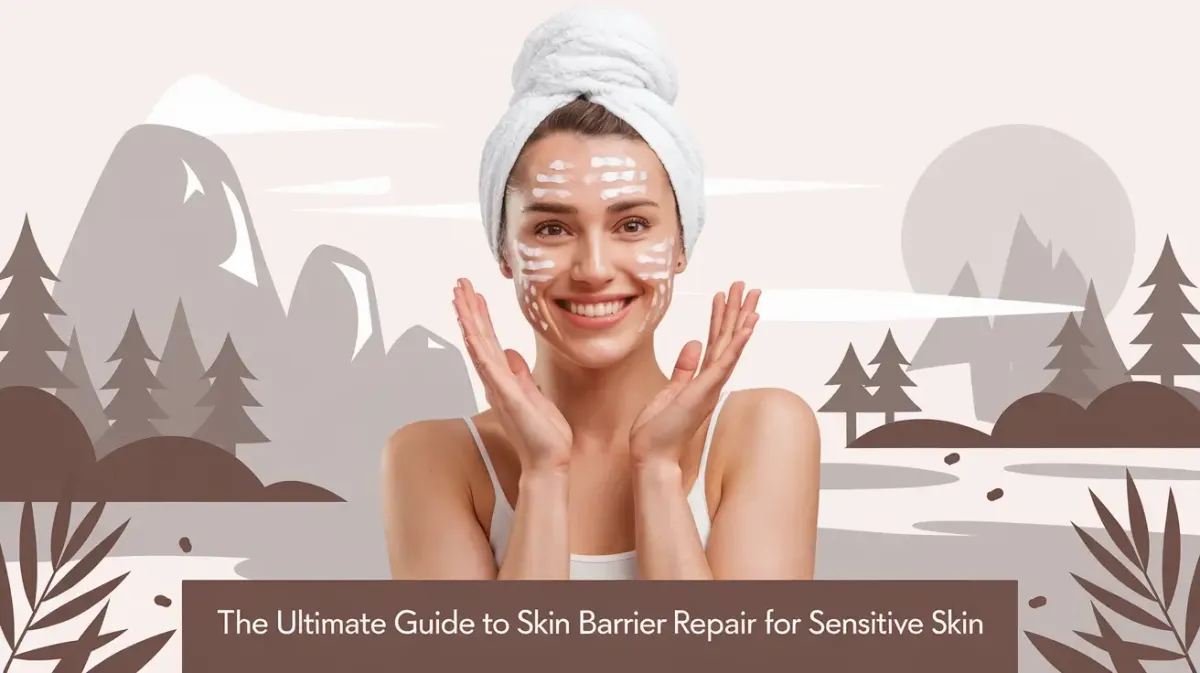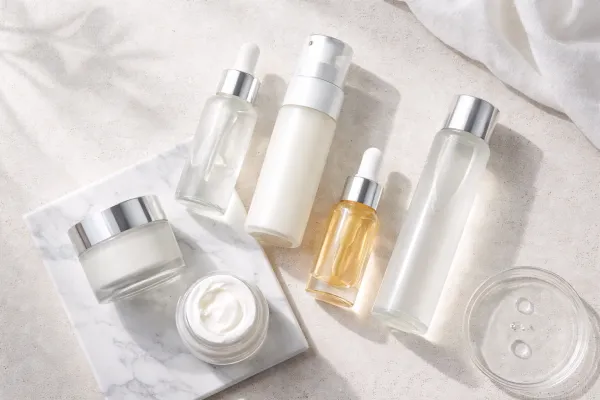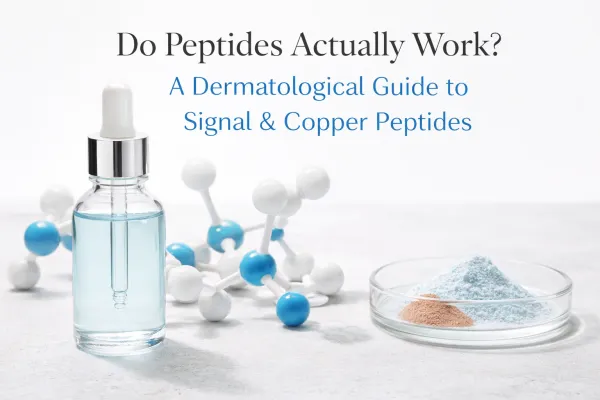The Ultimate Guide to Skin Barrier Repair for Sensitive Skin
Learn how to effectively repair your skin barrier for sensitive skin. Discover the best ingredients, practices, and products for a healthy, resilient complexion.

Ever feel like your skin is just… *off*? Like it’s constantly irritated, dry, or breaking out no matter what you do? You might be dealing with a compromised skin barrier. Think of your skin barrier as the bodyguard of your face – it’s there to protect you from the bad stuff and keep the good stuff in.
When it's damaged, it's like having a bodyguard that's fallen asleep on the job. This is especially true for those with sensitive skin, where even the gentlest breeze can feel like a hurricane. But don't worry, *skin barrier repair for sensitive skin* isn't some impossible mission.
It's about understanding what your skin needs and giving it the right support. I've seen countless people struggle with this, and trust me, with the right approach, you can get your skin back to its happy, healthy state.
Key Takeaways: Skin Barrier Repair for Sensitive Skin
- Understanding the Skin Barrier: The skin barrier is your body's first line of defense, protecting against irritants and retaining moisture.
- Signs of Damage: Dryness, redness, sensitivity, breakouts, and itchiness are key indicators of a compromised barrier.
- Gentle Cleansing is Key: Opt for sulfate-free, pH-balanced cleansers and avoid hot water.
- Barrier-Repairing Ingredients: Ceramides, hyaluronic acid, niacinamide, and colloidal oatmeal are essential for repair.
- Avoid Harsh Practices: Skip physical exfoliants and space out the use of active ingredients.
- Hydrate and Protect: Layer lightweight serums under rich creams to rebalance moisture levels.
- Benefits of a Healthy Barrier: Reduced risk of infections, minimized sensitivity, and improved skin appearance.
- Sensitive Skin Considerations: Use barrier repair creams and avoid combining too many active ingredients.
- Product Examples: Look for gentle cleansers and barrier repair creams with ceramides.
- Long-Term Approach: Consistent care and the right products can lead to significant improvements in skin health.
Understanding the Skin Barrier and Why It Matters
Your skin barrier, also known as the stratum corneum, is the outermost layer of your skin. It's like the brick wall of your house – it keeps the bad stuff out (like pollutants, bacteria, and irritants) and the good stuff in (like moisture). When this barrier is healthy, your skin is balanced, hydrated, and resilient.
But when it's compromised, it's like having holes in that wall, leaving your skin vulnerable. For those with sensitive skin, this is especially critical because their barrier is often more fragile to begin with.
I've seen so many people with sensitive skin who think they're just "naturally" prone to irritation, but often it's a sign of a damaged barrier.
It's not just about genetics; it's about how you treat your skin. A healthy barrier is the foundation for healthy skin, and it’s something you can absolutely influence. Think of it as the ultimate shield against the world, and when it's strong, your skin thrives. This is why *skin barrier repair* is so crucial, especially for sensitive skin.
- The skin barrier is the outermost layer of the skin.
- It protects against pollutants, bacteria, and irritants.
- It retains moisture, keeping the skin hydrated.
- A healthy barrier leads to balanced, resilient skin.
- Sensitive skin often has a more fragile barrier.
Recognizing the Signs of a Compromised Skin Barrier
How do you know if your skin barrier is struggling? It's not always obvious, but there are several telltale signs. Dry, flaky skin is a big one. If you're constantly reaching for moisturizer and your skin still feels tight and parched, that's a red flag. Redness and inflammation are also common, often accompanied by a burning or stinging sensation.

Increased sensitivity is another key indicator – if your skin is suddenly reacting to products that never bothered you before, your barrier is likely compromised. Breakouts and acne can also be a sign, as a weakened barrier allows bacteria to penetrate more easily. And finally, if your skin feels itchy and tight, that's a clear signal that it's lacking moisture.
I remember one client who came in with what she thought was just "bad skin," but after a proper assessment, it was clear her skin barrier was in desperate need of repair. These signs aren't just random skin issues; they're your skin's way of crying out for help.
If you notice any of these, it’s time to focus on *skin barrier repair*.
| Sign | Description |
|---|---|
| Dry, Flaky Skin | Persistent dryness and rough patches, indicating increased transepidermal water loss (TEWL). |
| Redness and Inflammation | Skin appears red, inflamed, and feels hot or irritated. |
| Increased Sensitivity | Skin reacts to products and environmental factors that previously didn't cause issues. |
| Breakouts and Acne | Frequent breakouts, as bacteria can penetrate more easily. |
| Itchiness and Tightness | Skin feels itchy or tight, indicating a lack of moisture. |
Gentle Cleansing: The Foundation of Skin Barrier Repair
One of the biggest mistakes people make when dealing with sensitive skin is using harsh cleansers. Think of it like this: if your skin barrier is already weak, using a strong cleanser is like kicking a person when they're down.
It strips away the natural oils that your skin needs to stay healthy, making the problem worse. The key is to use gentle, sulfate-free cleansers that are pH-balanced. These types of cleansers clean your skin without disrupting its natural balance.

Avoid hot water, as this can also exacerbate dryness and irritation. Instead, opt for lukewarm water. Micellar water or oil-based cleansers are also great options for removing impurities without compromising the barrier. I've seen a huge difference in my clients' skin just by switching to a gentler cleanser. It's a simple change, but it can make a world of difference in your journey to *skin barrier repair*.
👉Remember, cleansing should be about removing dirt and impurities, not stripping your skin bare.
- Use sulfate-free cleansers.
- Choose pH-balanced cleansers.
- Avoid hot water; use lukewarm water instead.
- Consider micellar water or oil-based cleansers.
- Focus on cleaning without stripping natural oils.
The Power of Barrier-Repairing Ingredients
When it comes to *skin barrier repair*, certain ingredients are absolute game-changers. Ceramides are one of the most important. They're like the mortar that holds your skin cells together, forming a protective barrier and locking in moisture.
Think of them as the superheroes of skin barrier health. Hyaluronic acid is another powerhouse ingredient. It's a humectant, which means it attracts moisture to the skin, keeping it hydrated and plump. Niacinamide is also incredibly beneficial. It helps calm redness, reduce blemishes, and improve the skin's overall barrier function.
And let's not forget colloidal oatmeal, a soothing ingredient that works wonders to calm irritated skin. I've personally seen these ingredients transform even the most sensitive skin. It's not about using every ingredient under the sun, but rather about choosing the right ones that work synergistically to rebuild and strengthen your skin's natural defenses. These ingredients are the building blocks of a healthy skin barrier.
- Ceramides: Form a protective barrier and retain moisture.
- Hyaluronic Acid: Attracts and retains moisture in the skin.
- Niacinamide: Calms redness, reduces blemishes, and improves barrier function.
- Colloidal Oatmeal: Soothes and calms irritated skin.
Avoiding Harsh Practices: Less is More
One of the biggest mistakes I see people make is over-exfoliating. Physical exfoliants, like scrubs, can create micro-tears in the skin's surface, further damaging the barrier.
It's like sanding down a wall that's already crumbling. Instead, if you need to exfoliate, opt for gentle chemical exfoliants, like AHAs or BHAs, and use them sparingly. The key is to be gentle and avoid overdoing it. I've had clients who were convinced that they needed to exfoliate daily, and their skin was a mess.
Once they cut back, their skin started to heal. Also, be mindful of how often you're using active ingredients like retinol or vitamin C. These can be great for your skin, but using them too frequently can overwhelm the barrier. It’s all about finding the right balance and avoiding anything that could further compromise your skin. Remember, when it comes to *skin barrier repair*, sometimes less is more. This is a marathon, not a sprint, so be patient and kind to your skin.
- Avoid physical exfoliants.
- Use chemical exfoliants sparingly.
- Space out the use of active products.
- Be gentle and avoid over-exfoliating.
- Focus on a balanced approach to skincare.
Hydration and Protection: The Dynamic Duo
Hydration is absolutely critical for *skin barrier repair*. Think of your skin like a plant – if it doesn't get enough water, it will wilt. The same goes for your skin. Using a lightweight serum, such as hyaluronic acid, layered under a rich emollient cream is a great way to provide both hydration and moisture.
The serum draws moisture into the skin, while the cream locks it in and provides a protective layer. This approach helps rebalance oil levels and can show results in as little as a month.
I've seen so many people who were afraid of using rich creams because they thought it would make their skin oily, but it's actually the opposite. When your skin is properly hydrated and moisturized, it's less likely to overproduce oil. It's all about finding the right balance and giving your skin what it needs to thrive.
👉Remember, hydration is about water content, while moisturization is about locking that water in. Both are essential for a healthy skin barrier.
| Step | Product | Purpose |
|---|---|---|
| 1 | Lightweight Serum (e.g., Hyaluronic Acid) | Draws moisture into the skin. |
| 2 | Rich Emollient Cream | Locks in moisture and provides a protective layer. |
The Benefits of a Healthy Skin Barrier
Repairing your skin barrier isn't just about addressing current issues; it's about preventing future problems. A healthy skin barrier reduces the risk of infections, minimizes sensitivity and irritation, and improves your overall skin appearance.
When your barrier is strong, it's much less likely that bacteria or irritants will penetrate your skin, leading to fewer breakouts and less inflammation. I've seen clients who were constantly battling redness and sensitivity, and once they focused on *skin barrier repair*, their skin became much calmer and more resilient.
A healthy barrier also allows your skincare products to work more effectively. When your skin is balanced and hydrated, active ingredients can penetrate deeper and deliver better results.
It's like having a well-tuned engine – everything runs more smoothly. The benefits of a healthy skin barrier go far beyond just aesthetics; they contribute to overall skin health and well-being. It's an investment in your skin's future.
- Reduces the risk of infections.
- Minimizes sensitivity and irritation.
- Improves overall skin appearance.
- Enhances the efficacy of skincare products.
- Contributes to overall skin health and well-being.
Special Considerations for Sensitive Skin
If you have sensitive skin, you know that not all skincare products are created equal. It's crucial to choose products that are specifically formulated to support the skin barrier without causing further irritation.
One of the best things you can do is incorporate a barrier repair cream into your routine. These creams often contain ceramides, which are essential for restoring the skin's natural moisture barrier. They provide intense hydration and help shield the skin from irritation, especially when using active ingredients like retinol.
I've seen clients with sensitive skin who were hesitant to use retinol because of the potential for irritation, but when they paired it with a barrier repair cream, they were able to tolerate it much better. Also, be careful about combining too many active ingredients at once. It's best to space them out to avoid overwhelming your skin.
Remember, the goal is to strengthen your barrier, not to irritate it further. *Skin barrier repair for sensitive skin* requires a gentle and mindful approach.
- Use products specifically formulated for sensitive skin.
- Incorporate a barrier repair cream into your routine.
- Avoid combining too many active ingredients at once.
- Be mindful of potential irritants in products.
- Focus on gentle and supportive skincare.
Example Products and Techniques for Skin Barrier Repair
Let's talk about some practical ways to incorporate *skin barrier repair* into your routine. One great example is the Retinol + Barrier Repair 2-Step System, which includes a retinol treatment and a ceramide-rich cream. This system is designed to help you use retinol without causing excessive irritation, thanks to the barrier repair cream.
For cleansers, look for products like the Murad Soothing Oat and Peptide Cleanser or the Byoma Milky Moisture Soothing Cleanser. These are designed to boost the barrier with ingredients like colloidal oat and ceramides without stripping the skin. I've seen these products work wonders for my clients with sensitive skin. It's all about finding products that are gentle yet effective.
Remember, it's not about using the most expensive products, but rather about choosing the right ones that work for your skin. It's about being informed and making smart choices for your skin's health.
- Retinol + Barrier Repair 2-Step System: Includes a retinol treatment and a ceramide cream.
- Gentle Cleansers: Look for cleansers with colloidal oat and ceramides.
- Barrier Repair Creams: Choose creams with ceramides for intense hydration.
- Focus on Hydration: Use a hyaluronic acid serum under a rich moisturizer.
- Protect Against Free Radicals: Incorporate antioxidants into your routine.
Conclusion: Your Journey to Healthy, Resilient Skin
Repairing your skin barrier, especially if you have sensitive skin, is not an overnight process. It requires patience, consistency, and a mindful approach to skincare. By focusing on gentle cleansing, barrier-repairing ingredients, avoiding harsh practices, and prioritizing hydration and protection, you can significantly improve your skin's health and resilience. Remember, your skin barrier is your body's first line of defense, and when it's strong, your skin thrives.
It's not about chasing perfection, but rather about achieving balance and health. I've seen countless people transform their skin by focusing on *skin barrier repair*, and I know you can too. It's about understanding your skin's needs and giving it the support it deserves. So, take the time to learn about your skin, be patient with the process, and celebrate the progress you make. Your skin will thank you for it.
What are some common questions people have about skin barrier repair? Well, many people wonder if they can use active ingredients while repairing their barrier. The answer is yes, but with caution. Introduce them slowly and always pair them with barrier-supporting products. Another common question is how long it takes to repair the skin barrier.
It varies, but most people see improvements within a few weeks to a couple of months. Consistency is key.
Finally, people often ask if they need to completely overhaul their skincare routine. The answer is not necessarily. Sometimes, just making a few key changes, like switching to a gentler cleanser and adding a barrier repair cream, can make a huge difference.

Frequently Asked Questions: The Ultimate Guide to Skin Barrier Repair for Sensitive Skin
What the Heck is a Skin Barrier, and Why Should I Care if Mine is Damaged?
Your skin barrier, also called the stratum corneum, is the outermost layer of your skin. It's like the protective shield for your face, keeping the good stuff (like moisture) in and the bad stuff (like irritants, allergens, and pollution) out. When it's healthy, your skin is happy, hydrated, and resilient. But when it's damaged, it's like having a cracked shield – you're vulnerable to all sorts of attacks.
For women with sensitive skin, the barrier is often naturally weaker, making it even more crucial to protect and repair it. The American Academy of Dermatology (AAD) emphasizes the importance of a healthy skin barrier for overall skin health.
How Do I Know if My Skin Barrier is Compromised?
Is your skin throwing a tantrum? Redness, dryness, flaking, itching, stinging, and increased sensitivity to products you used to tolerate are all signs of a compromised skin barrier.
Your skin might feel tight, rough, or even develop tiny cracks. Breakouts can also occur because a weakened barrier allows bacteria to penetrate more easily. Think of it as your skin waving a white flag, signaling it needs help.
What are Ceramides, and How Do They Help Repair My Sensitive Skin?
Ceramides are like the mortar between the bricks (skin cells) of your skin barrier. They're essential lipids that help maintain the barrier's structure and prevent moisture loss. When your skin lacks ceramides, it's like having a wall with missing mortar – weak and vulnerable. Moisturizers with ceramides help replenish these vital lipids, strengthening your skin's defenses. They are crucial for people with sensitive skin or conditions like eczema and psoriasis.
Why is Hyaluronic Acid a Must-Have for Hydrating Sensitive Skin?
Hyaluronic acid (HA) is a humectant, meaning it attracts and holds onto water like a magnet. It can hold up to 1000 times its weight in water! This makes it a powerhouse for hydrating sensitive skin without clogging pores or causing irritation. When your skin is properly hydrated, the skin barrier can function more effectively. Hyaluronic acid is a powerful humectant and often used in products designed for sensitive skin.
What the Heck is Niacinamide, and Why is it Good for Sensitive Skin?
Niacinamide, also known as vitamin B3, is a true multi-tasker for sensitive skin. It helps boost the skin's natural production of ceramides, strengthens the skin barrier, reduces redness and inflammation, and even helps regulate oil production. It's like a Swiss Army knife for your skin, addressing multiple concerns at once.
Why Should I Avoid Fragrance and Harsh Exfoliants if I Have Sensitive Skin?
Fragrances, even natural ones, are a common trigger for irritation and allergic reactions in sensitive skin. They can further compromise an already weakened skin barrier. Harsh exfoliants, especially physical scrubs with rough particles, can create micro-tears in the skin, leading to inflammation and increased sensitivity. Stick to fragrance-free products and gentle chemical exfoliants (like lactic acid or mandelic acid in low concentrations) if needed.
What's the Difference Between Hydration and Moisturization, and Why Do I Need Both?
Hydration is about increasing the water content of your skin, while moisturization is about preventing that water from escaping. Think of it like this: hydration is like filling a bucket with water, and moisturization is like putting a lid on it to keep the water from evaporating. Hyaluronic acid is a great hydrator, while ceramides, fatty acids, and occlusive ingredients like shea butter and dimethicone help to moisturize and seal in that hydration. You need both for optimal skin barrier repair.
How Can I Incorporate Barrier Repair into My Skincare Routine?
Follow these simple steps:
- Cleanse: Use a gentle, pH-balanced, sulfate-free cleanser.
- Hydrate: Apply a hyaluronic acid serum to damp skin.
- Repair: Use a moisturizer with ceramides, fatty acids, and cholesterol in a 1:1:1 ratio.
- Protect: Apply a broad-spectrum sunscreen with at least SPF 30 daily.
Can a Damaged Skin Barrier Cause Acne?
Yes, a compromised skin barrier can contribute to acne. When the barrier is weakened, it's easier for bacteria and irritants to penetrate the skin, leading to inflammation and breakouts. Also, dryness caused by a damaged barrier can trigger excess oil production, further clogging pores. Acne-prone skin needs gentle care.
How Long Does it Take to Repair a Damaged Skin Barrier?
It depends on the severity of the damage and the individual, but with consistent use of barrier-repairing products and gentle skincare practices, you can typically see improvements within 2-6 weeks. Remember, skin barrier repair is a marathon, not a sprint. Be patient and persistent, and you'll reap the rewards.





